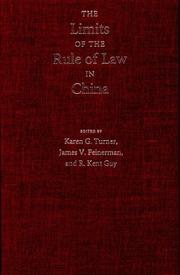| Listing 1 - 3 of 3 |
Sort by
|
Book
ISBN: 9780295997506 0295997508 9780295992952 0295992956 Year: 2013 Publisher: Seattle, [Washington] ; London, [England] : University of Washington Press,
Abstract | Keywords | Export | Availability | Bookmark
 Loading...
Loading...Choose an application
- Reference Manager
- EndNote
- RefWorks (Direct export to RefWorks)
During the Qing dynasty (1644–1911), the province emerged as an important element in the management of the expanding Chinese empire, with governors -- those in charge of these increasingly influential administrative units -- playing key roles. R. Kent Guy’s comprehensive study of this shift concentrates on the governorship system during the reigns of the Shunzhi, Kangxi, Yongzheng, and Qianlong emperors, who ruled China from 1644 to 1796.In the preceding Ming dynasty (1368–1644), the responsibilities of provincial officials were ill-defined and often shifting; Qing governors, in contrast, were influential members of a formal administrative hierarchy and enjoyed the support of the central government, including access to resources. These increasingly powerful officials extended the court’s influence into even the most distant territories of the Qing empire.Both masters of the routine processes of administration and troubleshooters for the central government, Qing governors were economic and political administrators who played crucial roles in the management of a larger and more complex empire than the Chinese had ever known. Administrative concerns varied from region to region: Henan was dominated by the great Yellow River, which flowed through the province; the Shandong governor dealt with the exchange of goods, ideas, and officials along the Grand Canal; in Zhili, relations between civilians and bannermen in the strategically significant coastal plain were key; and in northwestern Shanxi, governors dealt with border issues.Qing Governors and Their Provinces uses the records of governors’ appointments and the laws and practices that shaped them to reconstruct the development of the office of provincial governor and to examine the histories of governors’ appointments in each province. Interwoven throughout is colorful detail drawn from the governors’ biographies.
Governors --- Kings and rulers --- Public officers --- History --- China --- Politics and government
Book
ISBN: 9780295752945 0295752947 Year: 2024 Publisher: Seattle : University of Washington Press,
Abstract | Keywords | Export | Availability | Bookmark
 Loading...
Loading...Choose an application
- Reference Manager
- EndNote
- RefWorks (Direct export to RefWorks)
A probe into corruption in late Imperial ChinaAt the beginning of China's long eighteenth century or "High Qing" era, a time of peace and prosperity when the foundations of Manchu rule under the Qing dynasty were established, a courageous official named Guo Xiu reported on corruption at court. Guo Xiu's findings resulted in the impeachment of five of the most powerful figures of his day: the director of river conservancy, the chief grand secretary, and three scholars who advised the Manchu emperor on matters of Chinese culture. Weighing the officials' accomplishments against their corruption and violations of Confucian norms, the emperor dismissed all five from office-only to reappoint all five within ten years.Bringing together a rich trove of sources, including writings by the accused officials, Guo Xiu's impeachment comments, and court diaries, historian R. Kent Guy's Three Impeachments traces the process of impeachment, condemnation, and restoration to provide unique insights into the Kangxi golden age. Part 1 reveals that the highly lauded accomplishments of the Kangxi emperor were not his alone but the result of collaboration between Manchu elite, the newly formed Chinese Martial Banner Army, and Chinese scholars. Part 2, which focuses on Guo Xi's impeachments, sheds new light on dynastic history and political agency.Three Impeachments is a rich and enticing portal into a key moment in late imperial Chinese history.

ISBN: 0295803894 9780295803890 9780295994468 9780295979076 Year: 2000 Publisher: Seattle, [Washington] ; London, [England] : University of Washington Press,
Abstract | Keywords | Export | Availability | Bookmark
 Loading...
Loading...Choose an application
- Reference Manager
- EndNote
- RefWorks (Direct export to RefWorks)
In The Limits of the Rule of Law in China, fourteen authors from different academic disciplines reflect on questions that have troubled Chinese and Western scholars of jurisprudence since classical times. Using data from the early 19th century through the contemporary period, they analyze how tension between formal laws and discretionary judgment is discussed and manifested in the Chinese context.The contributions cover a wide range of topics, from interpreting the rationale for and legacy of Qing practices of collective punishment, confession at trial, and bureaucratic supervision to assessing the political and cultural forces that continue to limit the authority of formal legal institutions in the People’s Republic of China.
| Listing 1 - 3 of 3 |
Sort by
|

 Search
Search Feedback
Feedback About UniCat
About UniCat  Help
Help News
News